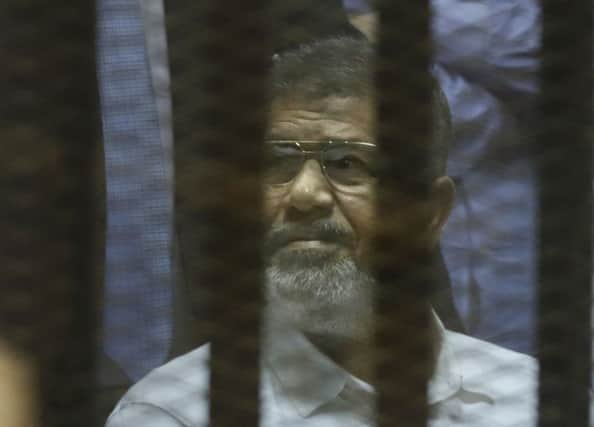Mohammed Morsi given 20 years but spared execution


The ruling, which can be appealed, and muted Islamist reaction following it underline the dramatic downfall of Morsi and Egypt’s once-powerful Muslim Brotherhood group. However, Morsi escaped a death sentence in the case.
Morsi and members of the Brotherhood swiftly rose to power in elections after autocrat Hosni Mubarak was ousted in 2011, only to find themselves imprisoned a year later when millions protested against them for abusing power and the military overthrew the government.
Advertisement
Hide AdAdvertisement
Hide AdBut as Mubarak and members of his government increasingly find themselves acquitted of criminal charges, Morsi and the Brotherhood are at the receiving end of heavy sentences.
Yesterday’s verdict sparked no immediate street protests, reflecting the toll of a heavy security crackdown on any show of dissident – either by Islamists or secular-leaning activists.
During the hearing, Judge Ahmed Youssef issued his verdict as Morsi and other defendants in the case – mostly Brotherhood leaders – stood in a soundproof glass cage inside a makeshift courtroom at Egypt’s national police academy. Seven of the accused were tried in absentia.
In addition to Morsi, 12 Brotherhood leaders and Islamist supporters, including Mohammed el-Beltagy and Essam el-Erian, were also sentenced to 20 years in prison. Judge Youssef had dropped murder charges involved in the case and said the sentences were linked to the “show of force” and unlawful detention associated with the case.
The case stems from violence outside the presidential palace in December 2012. Morsi’s supporters attacked opposition protesters who were demanding that Morsi call off a referendum on an Islamist-drafted constitution. Clashes developed into confrontations overnight that killed at least ten people.
During yesterday’s hearing, Morsi and the rest of the defendants in white jumpsuits raised the four-finger sign symbolizing the sit-in at the Rabaah al-Adawiya mosque, where hundreds were killed when security forces violently dispersed the sprawling sit-in by Morsi’s supporters on 14 August, 2013. They also smiled for cameras filming the hearing.
It was a far cry from when the trial first began, when Morsi repeatedly shouted to the court: “I am the president of the republic!”
During subsequent court appearances, Morsi and other defendants turned their backs to the court when Youssef played several videos of the clashes outside the palace in 2012.
Advertisement
Hide AdAdvertisement
Hide AdFrom his exile in Turkey’s capital, Istanbul, top Muslim Brotherhood figure Amr Darrag called the court’s ruling “a sad and terrible day in Egyptian history”.
“They want to pass a life sentence for democracy in Egypt,” he said.
Under the government of president Abdel- Fattah el-Sisi, who as army chief overthrew Morsi, Brotherhood members and Islamists have faced mass trials that end with mass death sentences, sparking international condemnation.
The heavy sentences have raised questions about the independence of Egypt’s judiciary, something analysts say could have contributed to the sentence Morsi received yesterday.